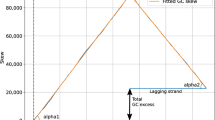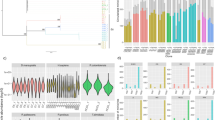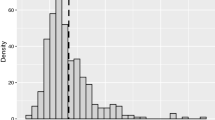Abstract
THE base composition of DNA, usually expressed as mean molar per cent of guanine plus cytosine (per cent G + C), has proved to be a useful indicator of phylogenetic relationships between organisms. Different base compositions suggest differences in genetic information, though the converse does not necessarily indicate genetic identity.
This is a preview of subscription content, access via your institution
Access options
Subscribe to this journal
Receive 51 print issues and online access
$199.00 per year
only $3.90 per issue
Buy this article
- Purchase on Springer Link
- Instant access to full article PDF
Prices may be subject to local taxes which are calculated during checkout
Similar content being viewed by others
References
Whitfield, P. R., Austral. J. Biol. Sci., 6, 234 (1953).
Walsh, C. J., and Sherman, I. W., J. Protozool., 15, 503 (1968).
Schildkraut, C. L., Marmur, J., and Doty, P., J. Mol. Biol., 4, 430 (1962).
Williamson, J., and Cover, B., Trans. Roy. Soc. Trop. Med. Hyg., 60, 425 (1966).
Brown, I. N., Brown, K. N., and Hills, L. A., Trans. Roy. Soc. Trop. Med. Hyg., 60, 3 (1966).
Author information
Authors and Affiliations
Rights and permissions
About this article
Cite this article
GUTTERIDGE, W., TRIGG, P. & WILLIAMSON, D. Base Compositions of DNA from some Malarial Parasites. Nature 224, 1210–1211 (1969). https://doi.org/10.1038/2241210a0
Received:
Revised:
Issue Date:
DOI: https://doi.org/10.1038/2241210a0
Comments
By submitting a comment you agree to abide by our Terms and Community Guidelines. If you find something abusive or that does not comply with our terms or guidelines please flag it as inappropriate.



